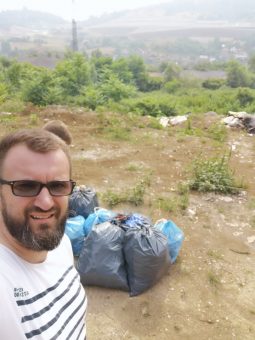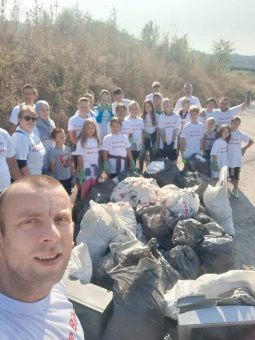
An informal Facebook group, whose goal is to make the citizens of Bosnia and Herzegovina become ecologically aware, has reached almost 53,000 members after nearly two years of existence, thus becoming a real eco-movement, that organized numerous wild landfill cleaning activities, afforestation as well as fish stocking activities. Safet Kubat, an activist and group leader, explains what the biggest ecology-related problems in BiH are and why the group “Be the change” is so special.
Over the course of more than 12 years, Safet Kubat from Zenica was an activist for many causes, but also he focused on serious scientific methods for resolving different social and ecological problems. For a long time, he felt a flame of trying to solve environmental problems and apply his knowledge in practice so as to mobilize his community. He firmly believes that it does not make sense to talk about the EU and NATO integrations without having first dealt with waste, i. e. waste in its widest form. This is how in early 2020 he created a Facebook group titled “The rivers of Bosnia and Herzegovina – Be the change“, which now has 53,000 members and has become a distinguished phenomenon and factor.
EP: How did the idea to create this Facebook group occur to you?
Safet Kubat: For a long time there was a spark in me wanting to solve waste problems, wild landfills, and at the end of the day to have Bosnia without waste, because that really pains me. The experience from western countries teaches us that waste is treated as a resource. For example, Sweden uses waste for heating, and it even purchases waste from Norway. Secondly, there is also the love for certain parts of BiH, the love I feel for rivers, for the Una River in particular. However, there was this one event that changed all for me. While we were mapping wild landfills in the municipality of Zavidovići, trying to make the authorities do their job, a man was passing by with a cart full of waste, just passing by a waste container and uphill for about 100 meters, over a goat track, to throw the waste out into the nature. He then went back happy, as if he had felt some kind of relief. I asked him: Wow, man, was that good? He responded: I cannot describe how happy I am having done that. I was left standing in awe and have been thinking about that event for a long time. When I asked him if he realized what he has done to nature, how he polluted the forest and the water he drinks, he gazed at me confused. Of course, I had to report him, but even today I have no idea whether he was punished or not, but that is a completely different problem. And then I created the group, without even thinking about the number of its members, but to become visible and have a tool for solving environmental problems.
In focus:
EP: Who are your supporters and what is the feedback you get?

Safet Kubat: In terms of support, our group is specific in that domain as well. We do not receive any donations, nor do we have commercial programs or accept sponsorship. The goal of all this is that the group remains autonomous, as well as the movement, that we are rapidly forming. Our biggest strengths are our activists, as a new form of activism, that does not originate from a typical civil sector. Here I must highlight media support, which mainly support us and our eco-activities. The feedback we get is amazing and originates mainly from the citizens, which gives us further strength but also raises our responsibility. This is all because the citizens want real social changes and problem-solving, not only pipe dreams. The activists roll up their sleeves and work, without much ado. This resulted in more than 2500 different cleaning activities.
EP: The group gains more and more followers who virtually support your work and the ideas you aspire to. What is the real situation when you are in the field?
Safet Kubat: In order to prove that our group is not merely a place to comment and publish articles, I am going to list some numbers that might answer your question best. Among other things, I would like to highlight 2,560 cleaning activities in various locations, more than 60,000 trees planted, as well as more than 55,000 fish in rivers and tributaries in our restocking activities. We have reported more than 100 polluters to the inspection, be it citizens or companies, and there are also numerous petitions, protests, amendments of laws, and active participation in public disputes. We have recorded more than 10,000 videos and published 22,000 posts in the group, that have more than 450 million views. I wish to mention a big eco-activity in the town of Zenica where we took more than 850 eco-activists to the streets, in only a few hours, and gathered 30 tons of waste, and set up 12 big eco-billboards.
Interviewed by: Milena Maglovski
Read the story in the new issue of the Energy portal Magazine RECYCLING.
Translator Vesna Savić



